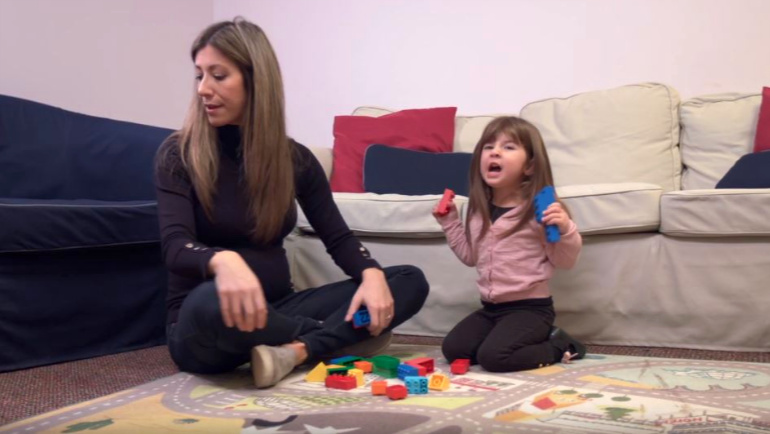
Parents of young children are beyond busy. Meals, baths, bedtimes, doctor visits, reading, playing, more meals, more baths. Not to mention trying to spend a little quality time with your child’s other parent. For parents of children that are challenging or disruptive, there can be little time to seek help or guidance.
Kathleen (Lucy) McGoron, PhD, the Merrill Palmer Skillman Institute’s newest faculty member, wants to make it easy for parents to learn new parenting strategies. She hopes parents can slot her high-tech approach into random down-times to enhance their skills in dealing with disruptive behaviors. “We have a wealth of research-based information out there,” McGoron said. “We need a way to connect it to parents in a meaningful way. This approach could create the bridge between basic research and the families who can benefit from it.”

The National Institute of Mental Health agrees. McGoron won a four-year, $533,000 grant to use her internet-based approach to identify disruptive behavior in children and motivate parent engagement. Her K01 Career Development Award provides support and mentorship to promising researchers training in a new field. “My PhD is in applied developmental psychology, basic research,” McGoron said. “I’m switching my focus to intervention development, especially mHealth approaches.”
Learn while you wait
McGoron’s Parenting Young Children Checkup (PYCC) will begin during check-in at the pediatrician’s office. Parents will be asked if they’d like to complete a brief screening on a tablet while they wait for the doctor. (The study will compensate them for their time.) If the child is exhibiting disruptive behavior, parents receive a brief intervention, also on the tablet. They then receive receive follow-on text messages linking to video-based content on a parent training website.
“Our first focus was whether parents would access parent training online. There’s no hope for a program that people won’t use,” McGoron said. The team expected resistance, assuming parents wouldn’t want to be told how to parent. They assumed wrong. “We received very positive feedback. Parents were open to any information,” Dr. McGoron said. “We kept probing, trying to tease out any resistance: What don’t you like? The response was, ‘Why wouldn’t I look at this on my phone? If you send me a 10-minute video that could help, why wouldn’t I watch it?’”
From here, the program’s content and graphics will continue to be refined based on feedback. Then the team will test whether the brief intervention and text messages motivate parents to learn new skills. Eventually they will ask about improvements in their child’s disruptive behavior. “But the main goal is to determine whether parents will make use of this type of approach. Are they logging in? Do they like this way to connect?”
Web-based training can have significant advantages over person-to-person:
- Not threatening or intimidating. Reaches parents reluctant to seek mental health services.
- Cost-effective and convenient.
- Perfect fidelity. Rather than train multiple therapists to deliver a program the same way, these messages stay consistent.
- Large reach – the chance to help thousands of parents make small but significant changes that impact their child's development.
- Frequency and content can be tailored to individual parents’ needs.
- Preventative. Children whose problems are not yet severe enough to warrant therapy, can be helped before they progress.
Insights from motherhood
McGoron’s role as mom to a 7- and 3-year-old crystallized her interested in using pediatrics and the internet to reach parents. “We were always at the doctor’s office when my kids were little,” she said, “Or Googling some of the silliest things in the world for help. For most parents, the resources they use most are their pediatrician and the internet.”
Now that the project is off to a good start, McGoron reflects on one of her earliest challenges: meeting with busy pediatricians to get permission to offer the tablet-based screening in their office. “They generally liked what we were trying to do,” McGoron said, but finding a time when they could complete the paperwork was difficult. “I gained enormous respect for how truly busy pediatricians are, on their feet all day, seeing patients back-to-back. It’s made me much more patient when I sit in the waiting room with my own children.”
